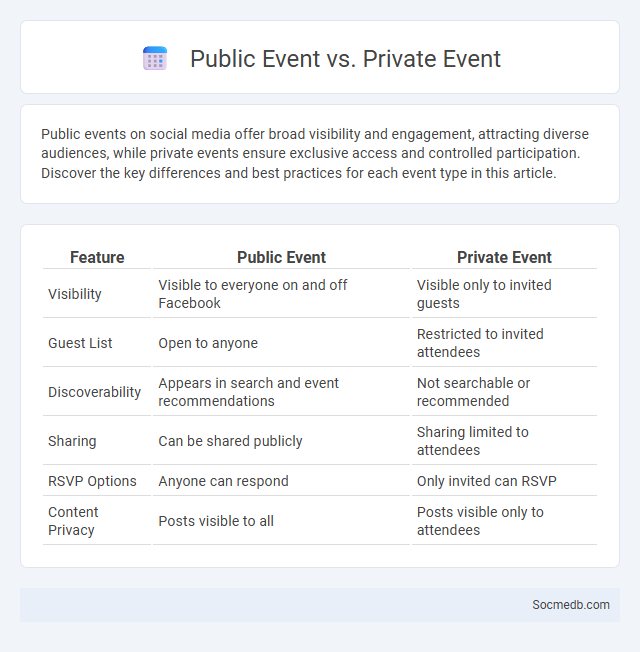
Photo illustration: Public Event vs Private Event
Public events on social media offer broad visibility and engagement, attracting diverse audiences, while private events ensure exclusive access and controlled participation. Discover the key differences and best practices for each event type in this article.
Table of Comparison
| Feature | Public Event | Private Event |
|---|---|---|
| Visibility | Visible to everyone on and off Facebook | Visible only to invited guests |
| Guest List | Open to anyone | Restricted to invited attendees |
| Discoverability | Appears in search and event recommendations | Not searchable or recommended |
| Sharing | Can be shared publicly | Sharing limited to attendees |
| RSVP Options | Anyone can respond | Only invited can RSVP |
| Content Privacy | Posts visible to all | Posts visible only to attendees |
Understanding Public Events
Public events on social media generate real-time insights through trending hashtags, user interactions, and multimedia content. Understanding these digital patterns helps you gauge public sentiment, identify key influencers, and measure event impact. Analyzing data from multiple platforms reveals comprehensive narratives and emerging topics relevant to your interests.
Defining Private Events
Private events on social media are restricted gatherings where access is limited to invited participants, ensuring confidentiality and controlled communication. You can create exclusive groups, event pages, or closed chats to maintain privacy and tailor content to specific audiences. This setup enhances security and fosters intimate interactions among selected attendees.
What Does RSVP Mean?
RSVP stands for "Repondez s'il vous plait," a French phrase meaning "Please respond," commonly used in social media event invitations to confirm attendance. When you receive an RSVP request, it helps the organizer plan and manage the event effectively by knowing who will participate. Your timely RSVP ensures smooth communication and accurate event preparation.
Key Differences: Public vs Private Events
Public social media events are open to all users, allowing wide visibility and engagement, while private events restrict access to invited participants only, ensuring exclusive interaction. Your choice between the two impacts audience reach, data privacy, and content control significantly. Public events often drive broader brand awareness, whereas private events foster intimate, targeted community connections.
Benefits of Hosting Public Events
Hosting public events on social media significantly boosts Your brand visibility and engagement by attracting diverse audiences and fostering authentic connections. These events facilitate real-time interaction, driving increased follower participation and loyalty while amplifying your message through shares and hashtags. Leveraging live streaming and social features enhances audience reach and creates measurable marketing impact.
Advantages of Private Events
Private events on social media offer enhanced control over guest lists and content sharing, ensuring your event remains exclusive and secure. They allow targeted engagement by enabling personalized interactions and tailored updates for attendees, boosting participation and satisfaction. Your brand or personal gatherings benefit from increased privacy and a focused audience, maximizing the impact and intimacy of the event experience.
The Importance of RSVPs in Event Planning
Accurate RSVPs are crucial for seamless event planning, ensuring precise guest counts and optimized resource allocation such as catering and seating arrangements. Social media platforms streamline the RSVP process, allowing hosts to track confirmations in real-time and communicate updates instantly. By securing your RSVPs promptly, you enhance event success and improve overall guest experience.
Choosing the Right Event Type
Choosing the right event type on social media significantly influences audience engagement and reach. Live streams foster real-time interaction and authenticity, while webinars offer educational value and in-depth discussions tailored to niche audiences. Virtual conferences provide a scalable platform for networking and brand positioning across multiple sectors or communities.
Legal and Privacy Considerations
Social media platforms collect extensive personal data, making it essential for you to understand privacy policies and terms of service to protect your information. Compliance with regulations such as GDPR, CCPA, and COPPA ensures that your rights regarding data collection, storage, and sharing are respected. Awareness of legal implications around content sharing, copyright, and user consent safeguards your online presence and prevents potential lawsuits or penalties.
Tips for Successful Event Management
Effective social media event management requires strategic planning and engaging content tailored to your target audience. Utilize platforms like Instagram, Facebook, and Twitter to create event-specific hashtags, share real-time updates, and encourage attendee interaction. Leveraging analytics tools helps you optimize post timing and measure engagement, ensuring your event's success and amplified reach.
 socmedb.com
socmedb.com